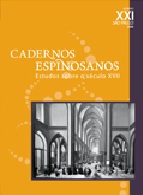The conception of human nature in Benedictus Spinoza
DOI:
https://doi.org/10.11606/issn.2447-9012.espinosa.2009.89371Keywords:
Spinoza, Ethica, Human nature, Mind, BodyAbstract
Spinoza in his Ethics conceives human nature as composed by means of two of God’s infinite attributes, thought and extension, or the idea and it’s object, the body. Human mind as an idea and the object of this idea, the body, assume a non-causal relation between the finite mode of thought and extension. The body, while a relation composed of motion and stillness is kept through the changes that affects its parts, is continually subjected to encounters by chance (occursus), or to the impact of multiple bodies around it. Mind reflects these encounters and through them acknowledges external bodies. It’s the afection-idea. It’s the imaginative knowledge, or the knowledge conditioned by the situation of our own body, by our temper, our previous experience and our individual prior concepts.Downloads
Download data is not yet available.
Downloads
Published
2009-12-15
Issue
Section
Artigos
License
Autores que publicam nesta revista concordam com os seguintes termos:
- Autores mantém os direitos autorais e concedem à revista o direito de primeira publicação, com o trabalho simultaneamente licenciado sob a Licença Creative Commons Attribution que permite o compartilhamento do trabalho com reconhecimento da autoria e publicação inicial nesta revista.
- Autores têm autorização para assumir contratos adicionais separadamente, para distribuição não-exclusiva da versão do trabalho publicada nesta revista (ex.: publicar em repositório institucional ou como capítulo de livro), com reconhecimento de autoria e publicação inicial nesta revista.
Authors who publish in this journal agree to the following terms:
a. Authors retain copyright and grant the journal the right of first publication with the work simultaneously licensed under the Creative Commons Attribution License that allows to share the work with an acknowledgment of its authorship and initial publication in this journal.
b. Authors are authorized to take on additional contracts separately, to non-exclusive distribution of the article published in this journal (ex.: to publish in institutional repository or as part of a book), with an acknowledgment of its initial publication in this journal.
How to Cite
Fragoso, E. A. da R. (2009). The conception of human nature in Benedictus Spinoza. Cadernos Espinosanos, 21, 83-95. https://doi.org/10.11606/issn.2447-9012.espinosa.2009.89371


